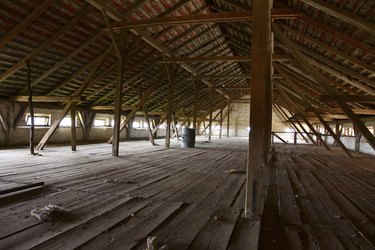
The awkward ceiling height and difficult access make many attics unusable as living space without costly remodeling work, but they can provide storage for a variety of items. Protect those items and make it easier to find what you need by organizing them in airtight bins or heavy-duty boxes, with the contents labeled. Unless you have a climate-controlled attic, certain items shouldn't be stored in this space. Delicate fabrics, including clothing and linens, and important documents and photos, may become damaged due to excess cold, heat, humidity and insects, even if stored in a container.
Seasonal Decorations and Goods
Video of the Day

Holiday decor, including menorahs, fake Christmas trees and associated decorations; and decorative lanterns for Ramadan stow away easily and safely in the attic. Store household items that you switch out depending on the time of year in your attic. During the summer, store heavy blankets, removable weather stripping, unused slow cookers and extra table leaves. In the winter, swap these out with lightweight bedding and spring-inspired fake flower arrangements as well as outdoor fryers, service ware and vinyl tablecloths.
Video of the Day
Household Items

Rarely used luggage and camping gear stay out of the way when stored in the attic. Similarly, excess ceramic and other household items store well in this space, including unused kitchen appliances and outdated electronics. Plastic or metal items, such as bird cages, outgrown children's play tables, metal bed frames and unused dog crates, stand up well to the fluctuation in temperature and humidity. Buy in bulk without over-filling your pantry and store dry foods in airtight containers and keep them close to the attic entrance for easy access. Although you may be tempted to store wood furniture in the attic, it's not the best long-term space for antique or high-end pieces; the constant shift in temperature may warp the wood.
Off-Season or Outgrown Clothing

Rotate clothing by season to keep drawers and closets organized, storing off-season clothes in the attic. Add mothballs to each container to prevent decay, and purge clothing items every time you rotate, tossing unworn or damaged products. Additionally, store maternity clothes, old children's clothes and outfits that don't fit but you may need in the future in your attic space. Avoid keeping delicate pieces in the attic; even with solid containers and mothballs, the temperature shifts and insects may damage the fine lace of a wedding dress or the fabric of high-end suits.
Books and Toys

Keep recently read books in the attic, leaving room in the main living space for favorites and unread publications. Metal filing cabinets work provide protection from bugs, but don't overfill drawers; books require space to breathe. Old toys and board games that you can't part with also find a place in your attic. Keep smaller items in plastic bins or sturdy boxes. Consider the composition of each item: The hair on an antique rocking horse may deteriorate if the attic isn't properly ventilated, but a baby's plastic activity seat will likely stand up well.